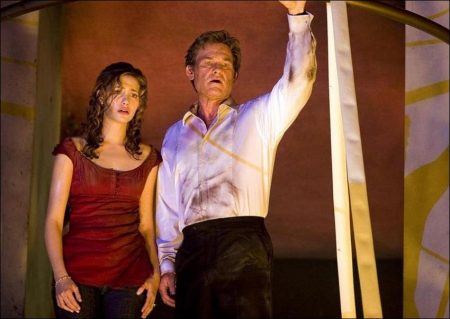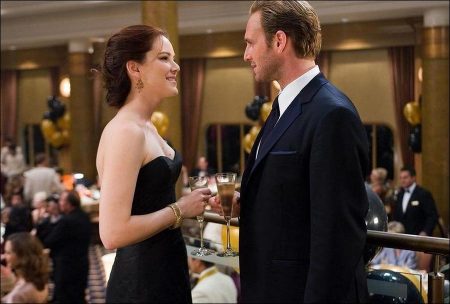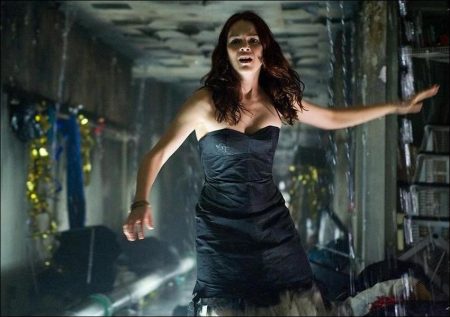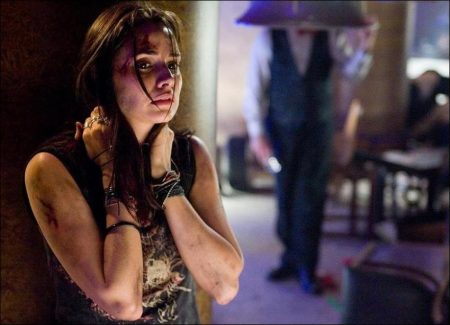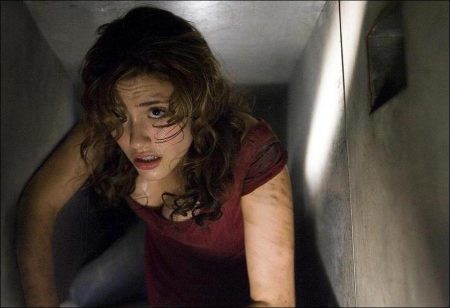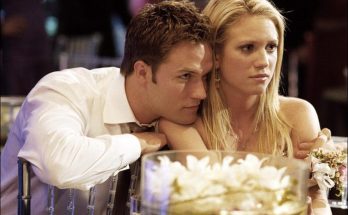Taglines: Mayday.
It’s New Year’s Eve and festivities have begun aboard the luxury cruise ship Poseidon, at sea in the North Atlantic. One of the finest vessels of its kind, Poseidon stands more than 20 stories tall, boasts 800 staterooms and 13 passenger decks. Tonight, many of the ship’s guests have gathered to greet the new year in style in the magnificent Main Ballroom. They raise champagne glasses as Captain Bradford (Andre Braugher) delivers a holiday toast and the band rolls into a version of Auld Lang Syne. Meanwhile, on the bridge, the Chief Officer senses that something is wrong.
Scanning the horizon, he sees it – a Rogue Wave; a monstrous wall of water over one hundred feet high, bearing down on them with tremendous speed. He tries to steer the ship away from maximum impact but it’s too late. The wave strikes with colossal force, pitching the ship heavily to port before rolling it completely upside down. Passengers and crew are thrown into free fall, crushed by debris or dragged into the sea as water bursts in through shattered windows. Supports collapse, broken gas lines ignite flash fires and lights fail, leaving vast sections of the ship in darkness and chaos. In its aftermath a few hundred survivors are left to huddle in the still-intact Main Ballroom, now resting below the waterline. They should stay together, the captain maintains.
One man, professional gambler Dylan Johns (Josh Lucas), prefers to test the odds alone. Ignoring orders, he prepares to exit the Ballroom and find his own way to safety, but is collared by nine-year-old Conor (Jimmy Bennett), who asks that Dylan take him and his mother Maggie (Jacinda Barrett) along. Fast behind them is Robert Ramsey (Kurt Russell), anxious to search for his daughter Jennifer (Emmy Rossum) and her fiancé Christian (Mike Vogel). Only an hour earlier this young couple had found it impossible to tell him they were engaged and now face much graver challenges.
Wary of alliances, Dylan reluctantly leads the small band of survivors upward through the bowels of the ship. Those who choose to join them rather than wait below include a shy stowaway (Mia Maestro), a suicidal man (Richard Dreyfuss) who re-discovers his will to live and a young waiter with knowledge of the ship’s layout (Freddy Rodriguez). Determined to fight their way to the surface, they must forge a path together through layers of wreckage as the ship continues to sink. Bonds form quickly in this journey of vertical climbs, dead ends and sheer drops. And trust proves vital.
What Would You Do if the Whole World Turned Upside Down?
The original movie, released in 1972 by 20th Century Fox, told the story of a ragtag group of survivors trapped on a passenger ship after it is capsized by a monster wave. It was followed by the 1979 sequel “Beyond the Poseidon Adventure,” which was released by Warner Bros. The new movie would be set in the present day and follow a new set of characters that attempts to survive after a tidal wave flips the S.S. Poseidon.
For filmmaker Wolfgang Petersen, Poseidon raises an intriguing and personal question: What would you do if the whole world turned upside down? “Would you be a courageous leader or a follower? Would you panic? Would you give up or keep on going?”
The acclaimed director of Troy, The Perfect Storm and Air Force One, Petersen rose to international prominence with the tense 1981 World War II submarine drama Das Boot, which earned him Oscar nominations for both direction and screenplay. A master storyteller acutely interested in human nature, he returns to the sea with Poseidon to focus not only on the power of a massive rogue wave that overturns a luxury cruise ship in open water, but on the intense dramas that play out among a group of people fighting to survive.
“In a disaster you really get to see who people are inside, with the artifice and the normal conventions of life stripped away,” he says. “Life-or-death decisions are made in seconds. When you see how people react and how they behave in extreme situations you know what they’re made of.”
“The Poseidon passengers came aboard to celebrate,” Petersen sets the stage, noting that Poseidon’s passengers are on the kind of cruise people take not to reach a destination but rather to enjoy the luxury and leisure of the journey itself. “It’s New Year’s Eve and they are beautifully dressed and ready to have fun. Everyone has plans for the future.” Indeed, as the clock strikes midnight even members of the ship’s staff take a minute for their own impromptu celebrations in the hallways and kitchens off the Grand Ballroom where guests gather to ring in the new year.
“All of a sudden they are attacked by a monster wave and everything is turned upside down. Things are hanging from the ceiling, falling down or peeling away from the walls, and there are gas leaks, steam, smoke and fires. Imagine your whole life changing in an instant and you must deal with the unthinkable. Nothing is where it should be and you are totally disoriented. It’s an apocalyptic world.”
Heightening the sense of panic, Petersen explains, is their confinement. “This is not something a person can run away from. Trapped within a closed environment where there is no escape, no help and very little time, they are forced to deal with it by themselves.” What begins as an immense and spacious setting becomes suddenly small and claustrophobic, broken into disconnected pockets of air and clogged passageways. “The movie starts with thousands of people, then hundreds, and then it becomes just a handful as everything draws tighter and more intimately focused.”
“The story taps into our primal fears – fire, drowning, falling, being trapped, being helpless,” says Poseidon producer Akiva Goldsman. Most recently a producer on Mr. and Mrs. Smith, Goldman’s screenwriting credits include an Oscar and a Golden Globe Award for A Beautiful Mind and a BAFTA nomination for 2005’s Cinderella Man. “Even if you never intend to set foot on a ship, these are disaster scenarios that could potentially find you anywhere.” On that level, adds producer Mike Fleiss (Texas Chainsaw Massacre, Hostel), “It’s a monster movie, but in this case the monster is water and it’s chasing them to the finish. It was Wolfgang’s intention to bring as many genuinely terrifying elements as possible into play.”
And what could be more terrifying than a disaster of this magnitude, striking in the middle of the sea where help, if it comes, would be hours away? “Rogue waves exist,” states Petersen, who has long considered water “the most dangerous, dramatic and unpredictable of elements,” and was aware of the phenomenon prior to embarking on Poseidon. Once the stuff of maritime legend, these veritable walls of water, as reported by eyewitnesses, have come under scientific observation only in recent years via ESA (European Space Agency) satellite technology. Long suspected but unproven as the cause of countless ocean disasters, they are now confirmed responsible for damage to cruise liners and off-shore oil rigs since the 1990s when serious research began.
Radar reports from one North Sea oil field indicate nearly 500 rogue wave assaults in the past 12 years and, more gravely, the ESA suggests they could be the cause behind many of the 200 supertankers and cargo ships sunk in the last 20 years, generally attributed to severe weather.
One notable example is the 43,000-ton München, overturned in the Atlantic in 1978 with no survivors. In 1995 the cruise liner Queen Mary 2 was luckier, narrowly surviving an encounter with an estimated 95-foot wave during a hurricane. While scientists cite strong currents as one likely origin of these monsters, focusing natural oceanic flow into a single force, there are also incidents of rogue waves that develop in the absence of strong currents, literally out of nowhere.
Producer Duncan Henderson, a 2004 Oscar nominee for Master and Commander: The Far Side of the World, teams here with Petersen for the third time after sharing producing duty on Outbreak and The Perfect Storm. He notes that, unlike Petersen’s other two seafaring dramas, Poseidon marks the first time a disaster catches its victims completely unprepared.
“The submarine crew of Das Boot were military and the fisherman in The Perfect Storm were professionals who had sailing experience so even though they weren’t prepared for the dire circumstances they ended up facing, at least they went into it with some expectation of risk. But Poseidon is a cruise ship. These are tourists like you and me. Not only is the scope of this tragedy much larger, it involves a group of people who are the least equipped to anticipate or deal with it.”
Screenwriter Mark Protosevich (The Cell) crossed the Atlantic himself on the Queen Mary 2 in preparation for his work on Poseidon. He found both passengers and crew to be a diverse mix of ages, nationalities and backgrounds, supporting Petersen’s assertion that “disasters are great equalizers. It doesn’t matter if you’re young or old, if you’re the richest person in the world or if you’re working in the kitchen; you’re all in it together.”
“This kind of crisis brings out our essential selves, the very best and the very worst, says Protosevich. “Relationships are tested and emotional bonds will be either strengthened or severed. If someone you love shows cowardice you will never forget it, but if they are willing to risk their own life for the sake of others you will never forget that either. The potential for heroism lies in each of us; whether or not we choose to act on it defines who we are.”
The challenges faced by the Poseidon survivors and the choices they make in some ways represent, for Petersen, a parable for life. “If you hold onto someone you might save him or maybe he will just pull you down. At what point will you decide to let go? Either way, it’s a shocking moment and nothing will ever be the same.”
The Poseidon filmmakers brought to this project a genuine fondness and respect for the 1972 film The Poseidon Adventure, from producer Irwin Allen and director Ronald Neame. Like that earlier film, a classic of its genre, Wolfgang Petersen’s Poseidon begins with the same concept and uses it as a catalyst for a fresh story. “We borrowed the idea of a luxury liner with thousands of people aboard, hit by a rogue wave on New Year’s Eve,” he explains, “and then started from scratch with an all-new screenplay and original, contemporary characters. Our story is in those characters, what they experience as individuals and as a group, and the way their journey ends.”
The Passengers
“This is about you,” Petersen emphasized from the start, telling his cast, “It’s not about things exploding or big tanks of water; it’s about how you handle your situation and how you behave. I want to see your sweat, your fear, everything.”
This ensemble of actors had to be not only talented but resilient. In addition to performing their own harness work from precipitous platforms and being blasted by incoming torrents, the final weeks of filming had the actors working underwater – a skill for which each received a week’s training from a diving safety team.
Josh Lucas, who stars as self-sufficient professional gambler Dylan Johns, was so committed to doing his own underwater stunt work that he practiced after-hours at home, a routine he finds somewhat comical in retrospect. “Having said I wanted to do it, I would stupidly go home after work, after being in water all day, and swim laps in the pool to see how long I could hold my breath,” he recalls.
Lucas attributes his enthusiasm largely to Petersen’s own joyful energy. “Wolfgang has this extraordinary charisma and I think its core is his absolute passion for filmmaking and for telling stories. We all felt it. It was impossible not to get caught up in it.”
Throughout production, the actor also found himself thinking about people who have actually struggled in extreme situations – a consciousness he shared with many of his colleagues, especially as news of the 2004 Indonesian tsunami was still fresh when filming began in June 2005. “I think we all felt a sense of responsibility to honor the experience and to really show what that fear and pain and claustrophobia is like. There was a moment where I came up from the water into a space with about an inch of breathing room above me and I genuinely panicked. I was so grateful to be on a film set.”
Another of Lucas’ challenging scenes involved not only water but fire. “The group gets separated while crossing the lobby where an oil spill has created essentially a pool of fire, and my character has to jump into this pool and swim underneath it with a fire hose to create a connection between the two sides. I had to come up at just the right spot and it was pretty hot and terrifying,” he admits. “There are some wild sequences in this film.”
Lucas, who charmed audiences as Reese Witherspoon’s true love in Sweet Home Alabama and shared a 2001 SAG Award nomination for A Beautiful Mind, describes Dylan as “a hustler, probably not of a caliber to play in Vegas but good enough to make some money off people on a cruise who’ve had a few drinks. He’s not a bad guy, but he’s not a hero either. He just wants to go his own way, take care of himself first and not worry about other people.”
Dylan’s dilemma arises when he tells young Conor his intention to escape the overturned ship by himself while the others patiently await rescue. Jimmy alerts his mother Maggie and their ensuing discussion is overheard by former fireman and ex-New York City mayor Robert Ramsey, eager to leave the ballroom to search for his missing daughter. Nelson, another passenger, is also game to climb. To help them navigate the ship’s unfamiliar architecture they enlist the help of a passing waiter, Valentin.
Dylan and Ramsey couldn’t be more different. Where Dylan is wary of assuming responsibility for the others and fears it will slow him down, Ramsey embodies a lifetime of leadership – for better or worse. Having met briefly on board and sized each other up over a tense poker standoff, the two men begin their odyssey already at odds. Says Lucas, “Dylan’s selfishness offends Ramsey at his core and Ramsey’s take-charge manner gets Dylan’s back up.”
Kurt Russell, who stars as Robert Ramsey, notes that one of the things he likes about the movie is how, “It allows you to get to know these people without being told explicitly who they are. Ramsey used to be a fire fighter who became mayor of a large city. He’s recently divorced and no longer in office and, ironically, he’s on this cruise to get away from an environment that has become very pressurized.”
Part of that pressure is his loving but difficult relationship with his headstrong 19-yearold daughter Jennifer, accompanying Ramsey on the cruise with her boyfriend, Christian. Rescuing Jennifer becomes Ramsey’s prime focus after the ship is hit. Whatever his failings as a father, a husband or an elected official, all that matters now is ensuring her safety and that means making his way to the floor above the ballroom, to the disco where the young couple went to ring in the new year – now a smoky ruin, where electricity and water make a fatal mix and Jennifer struggles to free Christian, trapped beneath a mass of metal.
From Ramsey’s pragmatic point of view, Russell notes, “When a ship capsizes like that, you only have two choices: you can stay in this one room where there’s still some air and hope you’ll be rescued before the ship goes down completely, or you can trust that feeling inside that tells you to take matters into your own hands and try to save your own life.”
Russell handled much of his own stunt work on Poseidon, a standard he has maintained throughout a remarkable career that began when he was only 10 years old. He has earned a lifetime of acclaim, including an Emmy Award nomination for his dead-on portrayal in the title role of ABC’s 1979 biopic Elvis and a Golden Globe nomination for Silkwood. Reflecting on the sometimes random nature of relationships that could literally save your life, he remarks on how strange it is, “To think that the most important few hours of your entire existence could be spent with people you barely know. Perhaps you don’t even know their names.”
Starring as young Jennifer is Golden Globe nominee Emmy Rossum (The Phantom of the Opera), and as her boyfriend Christian is Mike Vogel (The Texas Chainsaw Massacre). As the cruise begins, Jennifer, secretly engaged to Christian, is ambivalent about breaking the news to her over-protective single father. It is not his disapproval or denial that she really fears because she is clearly a spirited young woman who will stand her ground. “It’s more that she’s afraid of hurting her father by ‘abandoning’ him,” explains Rossum. “She loves her father. He’s always been there for her and now she’s at a point in her life where she’s fallen in love and wants to transfer her allegiance to the man she loves and she’s really torn between the two of them.
“It’s a challenge for everyone growing up to declare their independence and define who they are. The accident on board just accelerates the process,” Rossum continues, noting that, “In a situation like this people’s true colors are revealed and I think Jennifer emerges as a woman who is smart, courageous and loving.”
Production tested Rossum’s own courage and stamina beyond what she first expected. “I knew it would be physically and emotionally demanding just from reading the script,” she says. “But I didn’t realize the full extent of it until I was there. None of us did. Suddenly we were swimming 20 feet underwater in a tight corridor or sling-shotting across a three-story drop with just a harness and no safety net. It took a lot of courage, but I came to realize that fear is 85% mental. Once you conquer that, everything is easier.”
Likewise, in the role of Jennifer’s secret fiancé Christian, Mike Vogel successfully faced down his own potential vertigo – with help from an unexpected source, director Petersen’s passion for classical music. “It was the most surreal moment of the entire shoot,” Vogel recalls.
“We were standing on a sort of balcony 50 feet in the air over what remained of the lobby, upside down, and all around us was steam, sparks and water. We were all feeling a little apprehensive. Then Wolfgang surprised all of us by blasting a classical symphony. Once we all realized what was happening, we broke down laughing and it helped all of us relax. It was wild, though. The cameras and everything took on a musical rhythm, with Wolfgang as the conductor.”
From the beginning, Christian is anxious to reveal the truth about his relationship with Jennifer. An honorable young man, he feels the longer they delay the less respect Ramsey will have for him. “Throughout the story, Christian is anxious to prove himself to his future fatherin-law,” says Vogel. “He knows that in Ramsey’s eyes they are still kids. After the wave hits, everyone is focused on escaping but for Christian it’s still a matter of proving to Ramsey that he is worthy of his daughter.”
Aware of Ramsey’s accomplishments and stature, Vogel explains, “Christian knows he has a lot to live up to. Somehow he needs to show Ramsey that he is the man for Jennifer and that he is able to protect her. Their climb through the ship gives him that opportunity.”
Very much in love and anxious to begin their new life together, Jennifer and Christian throw their fates in with the others, aware that the next few hours might be all the time they will ever have. On the opposite side of the romantic spectrum is Richard Nelson, described by Richard Dreyfuss as, “a lonely, middle-aged man who is broken-hearted because his long-time love, with whom he intended to share this cruise, has suddenly left him for another man.”
New Year’s Eve finds Nelson alone at the ship’s railing, preparing to jump overboard. The sight of the approaching rogue wave snaps him out of his sad reverie and sends him rushing back to the ballroom in time for the melee that follows as the room rotates a full 360 degrees.
“He ends up being a real source of encouragement and even humor to the other survivors,” says Dreyfuss, noting that Nelson’s renewed will to live is severely tested more than once in the upward climb. “He gets injured along the way but he never gives up.” Dreyfuss, whose career encompasses an impressive range of credits and awards including an Oscar, BAFTA and Golden Globe for The Goodbye Girl, was himself a constant source of one-liners for castmates and crew. He joked to reporters that he joined Poseidon for the opportunity “to do a lot of slipping, falling, drowning and screaming,” and simultaneously poked fun at his Jaws fame by claiming Petersen valued his “underwater acting” skill.
“Movies have reached the point where you can be taken anywhere in your dreams,” says Dreyfuss, whose own pre-production Queen Mary 2 cruise gave him a feel for the environment and scale of a ship of that stature. “We had five stages devoted to this film and all of them in various stages of chaos. You can take essentially a football field and turn it on a degree. You can tell this story as if it’s real. Movie technology has gotten to the point where it is the individual talent of the filmmaker that can make anything look like you are really there.”
Conceding the powerful attraction of these kinds of survival stories, Dreyfuss adds, “It’s ‘Ten Little Indians’…and then there were nine, then eight and so on. We all want to know who makes it and who doesn’t and why; it’s human nature and it’s a great movie tradition.”
Starring as widowed mother Maggie James and her precocious son Conor are Australian actress Jacinda Barrett, whose U.S. feature credits include The Human Stain and Ladder 49, and 10-year-old Jimmy Bennett (only nine during production), a rising young actor with an already substantial resume including a recent role as Harrison Ford’s kidnapped son in Firewall.
“Maggie’s trying hard to support her child and create stability in his life because his dad died when he was very young,” Barrett says of her character, a single mother who works long hours and only took this holiday as a gift to the boy. Though proud of his self-assured maturity she knows it comes from his having grown up too quickly. “When the tragedy strikes, Conor tries to take care of his mother and comfort her in his usual way as if he doesn’t need a parent,” says Barrett. “But slowly a shift takes place and I think that as Maggie finds her strength more and more Conor is able to relinquish some of the grown-up behavior he’s been trying to uphold until, at the end, he’s just a kid who needs his mom.”
Barrett, who did her first gimbal work on Poseidon, found the level of action “exhilarating.” Of the production’s multi-camera system, she says, “I’d never shot with five cameras at once. It is a constant balancing act to set up the perfect shot for each camera and, as an actor, it keeps you on your toes as you never know exactly what all the cameras are seeing.”
Young Bennett, whose favorite scene is the one in which he leaps down from a piano bolted to the floor (now the ceiling) in the ruined ballroom, understands that, “Conor is pretty brave. He knows it and he enjoys it. When they’re climbing through the ship he’s always ready to do whatever he has to do, and he’s always asking ‘Mom, are you all right?’ because he doesn’t want her to be worried about him.”
Eager and able to perform many of his own stunts, Bennett was admittedly “bummed out whenever there were things I wasn’t allowed to do,” but still managed a lot of swimming. “I can hold my breath a long time,” he says. “I can do two laps in a row without breathing.”
Because of Maggie’s focus on her son and her work to the exclusion of a personal life, Barrett notes that, “when she meets Dylan at the New Year’s Eve party it kind of blindsides her,” their natural attraction being “something she was not looking for and hasn’t felt in a long time.
What charms her most is how Dylan connects with Conor.” That connection is partly what prompts her and her son to take a chance on following Dylan out of the ballroom. But Maggie is cautious, and will take the full measure of this man before she really trusts him.
Best known to audiences as Nadia Santos on the popular series Alias, Argentinean native Mia Maestro stars as the shy but courageous stowaway Elena, a woman with a deeply held faith. Bound for New York to see her brother in the hospital but unable to pay the fare, Elena was offered covert passage by her friend Valentin, one of the ship’s waiters, played by Freddy Rodriguez. After the ship turns over, she finds herself among the few survivors in the disco and tries to help a frantic Jennifer pull Christian free from heavy debris. When Ramsey and the others reach the disco, Elena joins them in their continuing climb.
Lonely herself, Elena soon forms a special bond with Nelson, who in turns helps her through the worst moments of their journey, traversing a dark and narrow duct that touches off Elena’s claustrophobia in a panic attack that threatens to turn her back.
“It’s a very touching film,” Maestro observes, “because you are watching what happens to these individuals in a life-and-death situation. In times like that people do things they would never think themselves capable of doing. They’re on the borderline, physically and psychologically and it’s a very interesting place.”
Maestro had both SCUBA diving and underwater acting experience prior to working on the set of Poseidon. For her, the wire work proved more daunting. “The first time is the toughest,” she admits. “Even though you know, rationally, you’re not going to die and we had an amazing group of stunt supervisors, it was still easy to get a little bit of vertigo looking down. What happens ultimately is that you just go with it.”
Like Vogel, she found Petersen’s impromptu classical concerts soothing and inspiring. One survivor who remains behind in the sunken ballroom, Captain Bradford, is played by stage and screen star Andre Braugher. Currently headlining the new FX series Thief, Braugher earned an Emmy Award for his portrayal of lead detective Pembleton on Homicide: Life on the Street and nominations for both Gideon’s Crossing and the acclaimed HBO miniseries The Tuskegee Airmen. Although the captain’s choice is dictated by duty, Braugher understands him to be the kind of man who would remain behind to lend comfort to the trapped and injured even if he had the option to flee.
Braugher recalls being particularly affected by “the sacrifice Bradford makes, the compassion he feels for his passengers and his love for his ship. Even during wholesale panic in the ballroom he stands to deliver the heroic lie and calm people down. He’s a good man. No matter how dire the circumstances, he remains steadfast.”
In preparation for the role, Braugher absorbed a great deal of technical advice, learned the basic functions of a ship’s propulsion and navigation as well as safety procedures. Interestingly, he says, “since no one anticipates ships turning over, there are no specific safety responses for it other than to close the bulkheads and try to seal off floors to slow sinking.”
Acknowledging that Poseidon raises questions about how each of us might act in such a situation, Braugher believes, “There’s really no way to know unless it happens. Am I injured or not? Am I with family? I would never leave my family alone so if they were injured of course we would never escape; if we’re going to be entombed, we would be entombed together.”
Freddy Rodriguez, whose work on the HBO series Six Feet Under has earned two SAG Awards plus three additional nominations and an Emmy nomination, blends pragmatism and compassion in the role of resourceful waiter Valentin. His knowledge of the ship’s layout prompts Ramsey to approach Valentin with a proposition.
“Ramsey offers him money, double his yearly salary, if he will help them,” says Rodriguez, who goes on to acknowledge that money is not Valentin’s sole motivation. “He would likely have helped them anyway, by his very nature, no to mention that he himself is anxious to get out. He’s a smart guy and he’s definitely a survivor.”
The role required Rodriguez to push himself to a level of physical performance beyond anything he’d previously done on camera, including one breathtaking stunt in which he appears suspended 15 feet over an elevator shaft by hanging onto the leg of Dreyfuss’ character Nelson. He jokes that the toughest part of that scene was “gaining a comfort level with the safety harness, which is basically a straightjacket with no sleeves.”
As for any lingering fears about disasters at sea, Rodriguez says, “I’ve never been on a cruise ship, but I’ve always wanted to go. It’s like Jaws. Do you stop going to the beach after seeing Jaws? You’ve got to live your life. Absolutely, I would go on a cruise tomorrow.”
Respected for his dramatic turns in Oliver Stone’s Platoon and The Doors, and currently drawing laughs in HBO’s Entourage, the versatile Kevin Dillon portrays Poseidon’s less-thancharming passenger Lucky Larry, who also survives the initial impact.
“Larry’s loud and flashy and kind of nasty; a guy who obviously has had a few too many drinks and is still drinking,” says Dillon, admitting it wasn’t easy to lend Larry a likeable dimension. “To his credit, he’s not such a bad guy – just really hammered. At the beginning he’s playing poker with the guys and is starting to annoy people, but after the trauma of the ship capsizing, he becomes more of an ugly drunk. It was a fun character to play.”
In the role of Gloria, the ship’s headline entertainer, is Stacy Ferguson. Best known to music fans as Fergie of the BLACK EYED PEAS, the multi-talented singer/composer began her career at a young age with acting, modeling and voiceover work. Twice nominated for a Young Actors Award as a series regular in the Disney Channel’s Kids Incorporated, she won the award in 1987 and went on to appear in several feature films including the horror spoof Monster in the Closet and the 2005 comedy Be Cool.
In addition to the traditional “Auld Lang Syne,” Ferguson performs two original songs in Poseidon. The ballad “Won’t Let You Fall,” co-written by her, will.i.am, Keith Harris, Byron McWilliams and Ron Fair, is “a beautiful, dramatic song that touches on one of the movie’s themes,” she explains. “It’s about loving and supporting someone unconditionally no matter what happens, and I think a lot of the survivors on the ship experience that.” In contrast, she collaborated with will.i.am and Printz Board on the Latin-tempo dance number “Bailamos,”
Spanish for let’s dance, which she performs in the film to kick off the New Year’s Eve party and “get those people out on the dance floor.”
Poseidon (2006)
Directed by: Wolfgang Petersen
Starring: Josh Lucas, Kurt Russell, Emmy Rossum, Jacinda Barrett, Jimmy Bennett, Mia Maestro, Richard Dreyfuss, Mike Vogel, Kevin Dillon, Kelly McNair, Gabriel Jarret
Screenplay by: Mark Protosevich
Production Design by: William Sandell
Cinematography by: John Seale
Film Editing by: Peter Honess
Costume Design by: Erica Edell Phillips
Set Decoration by: Robert Gould
Art Direction by: Kevin Ishioka, Mark W. Mansbridge, Mike Mansbridge, Brad Ricker
Music by: Klaus Badelt
MPAA Rating: PG-13 for intense prolonged sequences of disaster and peril.
Distributed by: Warner Bros. Pictures
Release Date: May 12, 2006
Visits: 137
